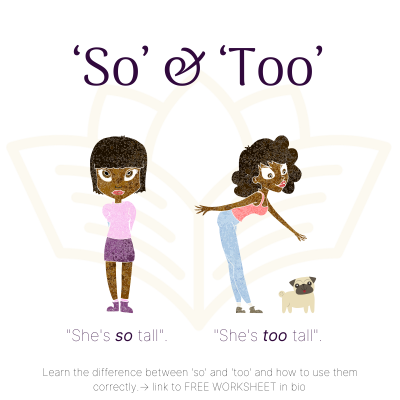The words 'so' and 'too' are often used interchangeably, whereas really, they mean different things. Read further; uncover the difference between these adverbs, intensifiers and emphasisers and learn how to use them correctly.
"She's so tall" VS "She's too tall".
So
So is used as an emphasiser or intensifier (to make the statement stronger).
“She’s so tall” – but it doesn’t bother her or anyone else.
so + adjective
- “The soup so hot” -> The soup is very hot
- “You are so young” -> You are very young
So has a similar meaning to ‘very‘ (but it’s a little stronger, or more intense).
note: ‘so‘ cannot be used before a noun.
E.g. We cannot say “He is so nice man”. Instead, we use such -> He is such a nice man.
Read here the difference between ‘such’, ‘so’ and ‘too’.
so + many/much + noun
- “He has so many friends“. -> He knows a lot of people and is very popular.
- “There isn’t so much water left”. -> We should get some soon, but it is not a problem, yet.
When so many or so much are used before a noun, it means a lot.(Remember: many is used before plural countable nouns (e.g. friends, people); much is used before uncountable nouns (e.g. money, water, sugar).
Too
Too is used as an emphasiser or intensifier, but often for negative things.
“She’s so tall” – she has a hard time dealing with things in her daily life.
too + adjective/adverb
- “The soup too hot” -> The soup is that hot that I cannot eat it.
- “You are too young” -> You are that young, you are not allowed to do certain things.
Too means too much or too little of something; more than a desired quantity/level.
too + adjective/adverb + infinitive
- “I was too tired to do my homework”. -> I didn’t do my homework, as I was extremely tired.
- “He ran too slowly to win the race”. -> His speed was that slow; he could not beat the rest)
- They speak too poorly to get a job. -> Their language skills are that poor that they will not be able to find a job.
similar meanings
- “It’s so hot today, let’s stay inside”. -> It’s very hot, but it does not necessarily bother me.
- “It’s too hot today, let’s stay inside”. -> It’s that hot, I cannot bear the heat.
Both of these sentences are correct and work well in this situation. In many situations though, one word is more suitable than the other.
What the difference between these examples?
- The camera was ___ expensive, but I bought it anyway.
- The camera was ___ expensive I could not afford it.


2 thoughts on “So and Too”